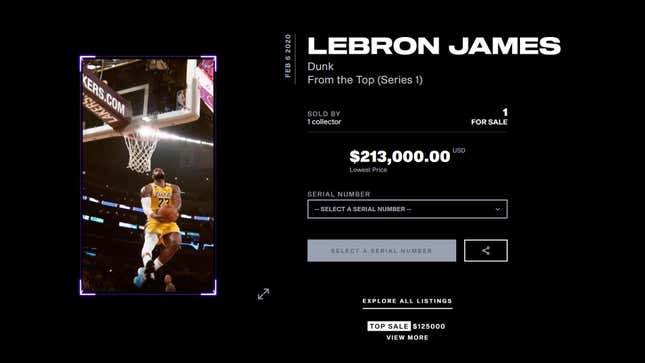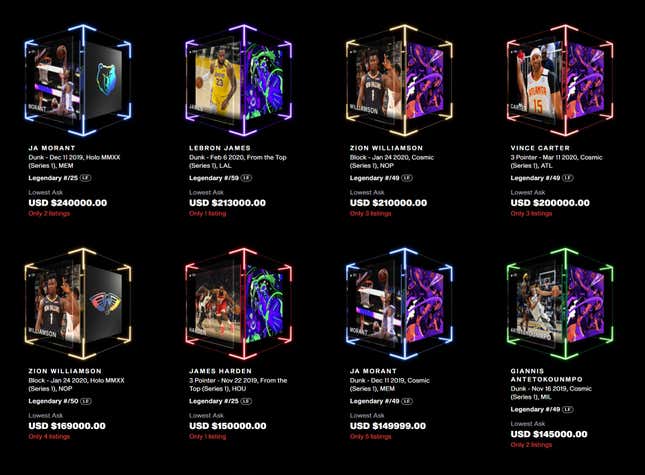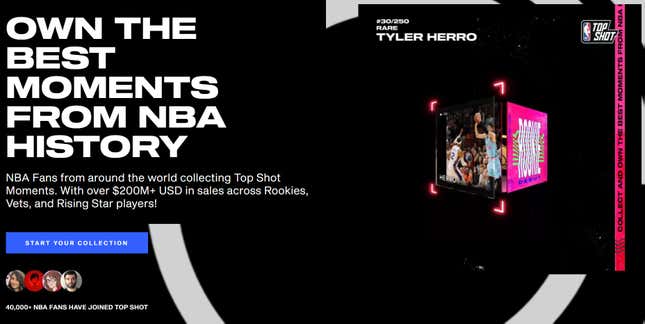
While gamers rail against loot boxes, and governments around the world edge ever closer to regulating them, connoisseurs of blockchain bullshit are falling over themselves trying to buy digital highlights of basketball players from a platform called “NBA Top Shot”. In effect they’re spending their money on a form of loot box that is even more useless than a packet of FIFA players.
Defector’s Dan McQuade has a good story up on just how this all works, with users able to buy certified one-of-a-kind digital highlights that exist on a blockchain. The catch is that these highlights aren’t available (officially through NBA Top Shot, at least) individually. You need to buy “packs” of them, and when you open that pack, you’ll get a random assortment of “moments” which might be a Steph Curry stepback 3, or, I dunno, James Harden jumping into a dude then falling over.
Because some of those moments are seen as more valuable than others, there’s a sizeable third-party market out there already, based on each highlight’s perceived “value”. And while loads of people have compared this to the market for basketball cards, I think comparing them to video game loot boxes is even more appropriate.
A basketball card, so long as it exists and can be held, is a thing, and may hold value for someone, somewhere, someday, simply by virtue of existing in a physical space. These NBA Top Shots are only valuable so long as crypto fans can convince themselves they have value, something anyone investing in Bitcoin or crypto art is admittedly very good at.

If you “owned” the “Blocked By James” NBA Top Shot, or Steph’s “BANG! BANG!” (which you actually couldn’t, since only more recent highlights are being sold, but I’m just painting a picture here), how much do you think they would be worth? Going by the recent sale price of $208,000 for a Lebron dunk, probably a lot!
But what are they really worth? NBA Top Shots are an officially licensed product, where the NBA has signed a deal with developer and platform holder Dapper Labs, that means each highlight is certified as one-of-a-kind and coming with the blessing of the league. So if you buy a pack, you’re not just buying some videos, you’re buying some NBA-certified videos. And the NBA and Dapper Labs are splitting that money.
Below, however, is the same Lebron dunk that a dude just paid $208,000 for. You can watch this in HD, right here, on this unrelated video game website, and it doesn’t take much Google work to find ways to download it and store it on your own HDD, meaning you could theoretically make a million copies of it and store them all over the world, in both physical and digital form, maybe even as a flipbook, so you and your ancestors have access to the video in perpetuity. All for free.
What the guy spending $208,000 on a video is gambling, like anyone buying crypto art or investing in crypto currencies like Bitcoin is gambling, is that their purchases are an investment, and whatever they’re worth today, they’ll be worth more sometime in the future. The point here isn’t even that these guys are NBA fans. The content is irrelevant, it’s the market itself, and the opportunity for a quick buck, that’s the draw.
It’s a mirage, of course, one built on tech weirdos trying to speculate their way into a new, digital world while contributing greatly to the destruction of the existing, actual one. It’s at best the latest example of a digital Tulip Mania, at worst a complete scam. The NBA likely knows this and is just happy to skim money off these suckers, while Dapper Labs definitely know this, since they’re the same team behind Cryptokitties, a cat-collecting game whose boom and bust seems to have had no effect on...anyone
It’s wild to me how similar this market is to video game loot boxes. The gambling, its origins in real world card collecting, the resale market, the idea that a collection of 1s and 0s confined to a digital space can hold any real value at all. But at least when it comes to video game loot boxes, there’s a practical use of the thing you “own”: a Counter-Strike skin is something you can see (and be seen using) in a game that you’re playing, and a rare NBA 2K player may have better stats than your opponent’s, giving you a competitive advantage.
With NBA Topshots, there’s just the illusion of ownership of something that, like I just showed, anyone can go out right now and view and take for nothing. You don’t actually own shit. You “own” a single copy of a video that some companies decided to monetise, and you were stupid enough to pay them—or someone else—for the supposed privilege.

What really gets me though is that while gamers grow increasingly wary of loot boxes, to the point that many governments are taking action and other games are toning down their use, there’s no such caution here. There’s this feeling among certain crowds—a Venn diagram where the overlap between “bitcoin proselytiser” and “GameStop stock kids” is almost non-existent—that there’s money to be made in them thar internet hills, if only everyone believes it strongly enough to make it a reality.
Those people will say that the same rules about the market apply here as they apply everywhere else. That something will always be valuable so long as others find value in it. But other age-old rules apply too, like fools and their money being easily parted.